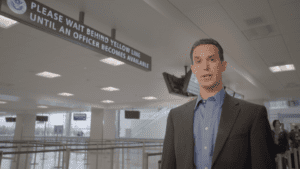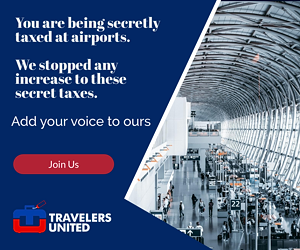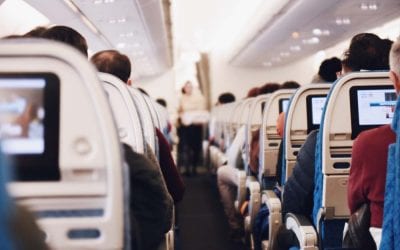There is no need for fully vaccinated travelers to get a pre-departure test to return home
 Travelers United joined with 27 other international travel, tourism, airline, airport, travel agent, and others (the complete list follows the letter) to stop the current requirement for fully vaccinated travelers to take a pre-departure test.
Travelers United joined with 27 other international travel, tourism, airline, airport, travel agent, and others (the complete list follows the letter) to stop the current requirement for fully vaccinated travelers to take a pre-departure test.
Our organization has heard from many travelers who have put off international travel because of their fear of being stuck overseas should they test positive. At Travelers United we believe in the benefits of vaccinations and of booster shots. For the government, encouraging and mandating vaccination then ignoring that solution seems counterproductive.
We know from surveys that travelers simply are unwilling to take the chance that they will be unable to return to the U.S. at the end of their business trip or vacation. Travelers United desires a quick rebirth for travel and tourism. We strongly feel that pre-departure testing for citizens returning home is ineffective and damages international travel growth. The letter sent yesterday to The White House Coronavirus Response Coordinator follows:
February 2, 2022
Mr. Jeffrey Zients
White House Coronavirus Response Coordinator
The White House
1600 Pennsylvania Ave., N.W.
Washington, DC 20500
Dear Mr. Zients:
On behalf of the many sectors of the travel and aviation industries, we urgently request that the Administration remove the requirement for pre-departure testing for vaccinated passengers traveling to the United States. Doing so is justified by the pervasiveness of COVID cases in all 50 states, increased immunity, and higher vaccination rates as well as new treatments. Removing the requirement will greatly support the recovery of travel and aviation in the United States and globally without increasing the spread of COVID-19 and its variants.
The following factors strongly support the argument for removing the pre-departure testing requirement:
- As of today, more than 74.3 million people have had COVID in the U.S., meaning that at least 22 percent of the population has had the virus (though this figure is almost certainly an underestimate due to the number of asymptomatic infections and limited testing early in the pandemic). In December, the seven-day average for newly reported cases in the U.S. topped 700,000, 73 percent of which were the Omicron variant. Clearly, COVID is widespread throughout the U.S., and attempts to control its importation via air travel under today’s circumstances are unlikely to change that fact. No new threatening variants appear to be imminent, but if they were, pre-departure testing could be easily reinstituted.
- The European Union has recommended that its countries remove intra-Europe COVID travel restrictions and the United Kingdom has announced the removal of COVID pre-departure testing for vaccinated air travelers to enter the country. The UK concluded that the cost to both passengers and airlines of the testing mandate could no longer be justified as there was no evidence the regime protected the population from COVID. This decision was supported by a January 5, 2022 study by Oxera and Edge Health that concluded when a variant is already highly prevalent in the domestic environment travel restrictions are likely to have a very limited impact on the growth and the peak of cases and hospitalizations. This modeling result was replicated for Finland and Italy in a study released on February 1, 2022, which again found that testing of travelers has virtually no impact on domestic infection rates.
- The World Health Organization (WHO) recommends that states consider a risk-based approach to the facilitation of international travel by lifting measures such as testing and/or quarantine requirements for individual travelers who are fully vaccinated, at least two weeks prior to traveling, with COVID-19 vaccines listed by the WHO for emergency use or approved by a stringent regulatory authority.
- Surveys of air passengers indicate that a pre-departure test is a leading factor in the decision not to travel internationally. People simply are unwilling to take the chance that they will be unable to return to the U.S. at the end of their business trip or vacation. As a result, international travel in 2021 was 75 percent below 2019 levels.
We share the Administration’s commitment to getting as many people fully vaccinated and boosted as possible.
The removal of this impediment for vaccinated travel will further incentivize vaccinations. Travel and aviation’s recovery is dependent on the government taking steps to remove travel restrictions that are no longer justified by current circumstances.
Thank you for your consideration and we stand ready to work with you to implement this important step toward learning to live with COVID in a way that doesn’t compromise health and safety.

Respectfully,
Advantage Travel Partnership
Aeronautical Repair Station Association
Aerospace Industries Association
Airline Passenger Experience Association Airlines for America
Airlines for Europe
Airports Council International-North America
Airport Operators Association
American Association of Airport Executives
American Hotel and Lodging Association
American Society of Travel Advisors
Association of Asia Pacific
Airlines Association of UK Airlines
Business Travel Association
Global Business Travel Association
International Air Transport Association
International Flight Services Association
Latin American Air Transport
National Air Carrier Association
National Airlines Council of Canada
Regional Airline Association
Southwest Airlines Pilots Association
Travel Again
Travel Technology Association
Travelers United
UKInbound
US Chamber of Commerce
US Travel Association

Read Also:
COVID testing, vaccination and passport woes can ruin international journeys
Biden’s Omicron plan — a great start for travelers but needs expansion

Charlie Leocha is the President of Travelers United. He has been working in Washington, DC, for the past 14 years with Congress, the Department of Transportation, and industry stakeholders on travel issues. He was the first consumer representative to the Advisory Committee for Aviation Consumer Protections appointed by the Secretary of Transportation from 2012 through 2018.



